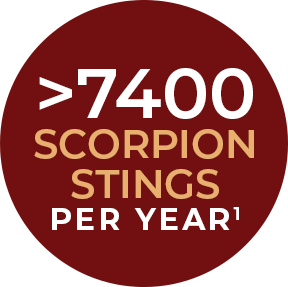ANASCORP®
The only FDA-approved treatment for patients with clinical signs of scorpion envenomation.

TO ORDER ANASCORP | Call 1-844-4RareTx (1-844-472-7389)

How quickly can patients be relieved of systemic signs associated with scorpion envenomation?
In the United States, poison control centers report over 7400 stings per year, with the majority of these cases coming from the Southwest—Arizona in particular.1 Arizona has the highest incidence of scorpion envenomation in the country, with over 5200 exposures annually.2

To order ANASCORP or report
suspected adverse reactions, contact:
Therapeutics, Inc.
1-844-472-7389
To report suspected
adverse reactions, contact:
1-800-FDA-1088
www.fda.gov/medwatch
For consultation on managing
local scorpion stings, contact:
Control Center
1-800-222-1222
- Gummin DD, Mowry JB, Beuhler MC, Spyker DA, et al. (2023) 2022 Annual Report of the National Poison Data System® (NPDS) from America’s Poison Centers®: 40th Annual Report. Clin Toxicol (Phila). 2023;61(10):717-939. doi: 10.1080/15563650.2023.2268981
- Arizona Poison and Drug Information Center, 2022.
INDICATION
ANASCORP® [centruroides (scorpion) immune F(ab')2 (equine) injection] is an equine-derived antivenom indicated for treatment of patients with clinical signs of scorpion envenomation.
IMPORTANT SAFETY INFORMATION
INDICATION
ANASCORP® [centruroides (scorpion) immune F(ab')2 (equine) injection] is an equine-derived antivenom indicated for treatment of patients with clinical signs of scorpion envenomation.
IMPORTANT SAFETY INFORMATION
CONTRAINDICATIONS
None.
WARNINGS AND PRECAUTIONS
Hypersensitivity Reactions
Severe hypersensitivity reactions, including anaphylaxis, may occur with ANASCORP. Close patient monitoring for hypersensitivity reactions and readiness with intravenous therapy using epinephrine, corticosteroids, and diphenhydramine hydrochloride is recommended during the infusion of ANASCORP. If an anaphylactic reaction occurs during the infusion, terminate administration at once and administer appropriate emergency medical care. Patients with known allergies to horse protein are particularly at risk for an anaphylactic reaction. Patients who have had previous therapy with ANASCORP or another equine antivenom/antitoxin may have become sensitized to equine protein and be at risk for a severe hypersensitivity reaction.
Delayed Allergic Reactions
(Serum Sickness) Monitor patients with follow-up visit(s) for signs and symptoms of delayed allergic reactions or serum sickness (e.g., rash, fever, myalgia, arthralgia), and treat appropriately if necessary. Eight out of 1,534 (0.5%) patients in the clinical trials exhibited symptoms suggestive of serum sickness.
Transmissible Infectious
Agents ANASCORP is made from equine (horse) plasma, it may therefore carry a risk of transmitting infectious agents, e.g., viruses.
Reaction to Cresol
Trace amounts of cresol from the manufacturing process are contained in ANASCORP. Localized reactions and generalized myalgias have been reported with the use of cresol as an injectable excipient.
ADVERSE REACTIONS
The most common adverse reactions observed in ? 2% of patients in the clinical studies for ANASCORP were: vomiting, pyrexia, rash, nausea and pruritus.
See Full Prescribing Information.
To report SUSPECTED ADVERSE REACTIONS, contact Rare Disease Therapeutics, Inc., at 1-844-472-7389 or by email at safety@raretx.com, or FDA at 1-800-FDA-1088 or www.fda.gov/medwatch.
ANS-ISIF-001
ANASCORP® [centruroides (scorpion) immune F(ab')2 (equine) injection] is an equine-derived antivenom indicated for treatment of patients with clinical signs of scorpion envenomation.
IMPORTANT SAFETY INFORMATION
CONTRAINDICATIONS
None.
WARNINGS AND PRECAUTIONS
Hypersensitivity Reactions
Severe hypersensitivity reactions, including anaphylaxis, may occur with ANASCORP. Close patient monitoring for hypersensitivity reactions and readiness with intravenous therapy using epinephrine, corticosteroids, and diphenhydramine hydrochloride is recommended during the infusion of ANASCORP. If an anaphylactic reaction occurs during the infusion, terminate administration at once and administer appropriate emergency medical care.
Patients with known allergies to horse protein are particularly at risk for an anaphylactic reaction. Patients who have had previous therapy with ANASCORP or another equine antivenom/antitoxin may have become sensitized to equine protein and be at risk for a severe hypersensitivity reaction.
Delayed Allergic Reactions (Serum Sickness)
Monitor patients with follow-up visit(s) for signs and symptoms of delayed allergic reactions or serum sickness (e.g., rash, fever, myalgia, arthralgia), and treat appropriately if necessary. Eight out of 1,534 (0.5%) patients in the clinical trials exhibited symptoms suggestive of serum sickness.
Transmissible Infectious Agents
ANASCORP is made from equine (horse) plasma, it may therefore carry a risk of transmitting infectious agents, e.g., viruses.
Reaction to Cresol
Trace amounts of cresol from the manufacturing process are contained in ANASCORP. Localized reactions and generalized myalgias have been reported with the use of cresol as an injectable excipient.
ADVERSE REACTIONS
The most common adverse reactions observed in ≥ 2% of patients in the clinical studies for ANASCORP were: vomiting, pyrexia, rash, nausea and pruritus.
Please see complete Prescribing Information.
To report SUSPECTED ADVERSE REACTIONS, contact Rare Disease Therapeutics, Inc., at 1-844-472-7389 or by email at safety@raretx.com, or contact FDA at 1-800-FDA-1088 or www.fda.gov/medwatch.
ANS-ISIF-001

2550 Meridian Blvd. Suite 150
Franklin, TN 37067
To order ANASCORP, call:
1-844-4RareTx (1-844-472-7389)
ANASCORP is exclusively distributed by:
AnovoRx www.anovorx.com
![ANASCORP® [centruroides (scorpion) immune F(ab')? (equine) injection]](https://www.anascorp-us.com/wp-content/uploads/2024/05/AnascorpLogo_color-tall.png)